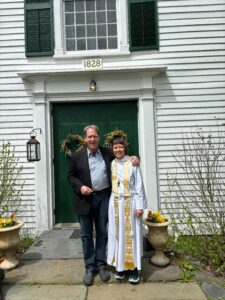May 18, 2025
Delivered by the Rev. Dr. Margaret Bullitt-Jonas at St. John’s Episcopal Church, Ashfield, MA
Acts 11:1-8
Psalm 148
Revelation 21:1-6
John 13:31-35
The Jesus Movement
Years ago, when I was a young adult and completely baffled about my vocation – What was my life about? What kind of work did I want to do? What spiritual path, if any, did I want to follow? – I signed up for a workshop called “Opening the Heart.” For several weeks, a group of us met in a church parish hall, listening to a series of presentations and doing some guided meditation. One evening, the instructor explained that each of us had come into the world for a reason. Each of us had come here because there was something we needed to accomplish and to learn. She invited us to lie down on the floor, to relax our bodies and quiet our minds. Before long, the room fell silent. Then she invited us to imagine that before we came into the world, we chose who our parents would be. She asked us, why had we chosen our mother? Was there something we’d wanted to learn from our relationship with her? Why had we chosen our father? Was there something we’d wanted to learn from our relationship with him?
Answers floated into my mind as I lay there, reflecting in silence. Then came a final question: When the time came for us to be born, what had we come here to do? This time, the answer came through me with such unexpected force that I sat bolt upright and looked around in surprise. Surging through me was a single word: Love. The purpose of my life was to love. It was as simple and certain as that.

I mention this, of course, because our brief passage from John’s Gospel is about as clear and straightforward as can be. Jesus is preparing to leave his friends. The hour of his passion and death are almost upon him. Judas has slipped out into the night to fetch the soldiers and temple police who will carry out the arrest. As the door closes behind Judas, Jesus turns to his disciples, not with anxiety or fear, nor with anger against the person who will betray him, but with the same outpouring love that he expressed when he gave his body to them in the bread and wine, and when he humbly washed their feet. “I give you a new commandment,” he says, “that you love one another. Just as I have loved you, you also should love one another. By this everyone will know that you are my disciples, if you have love for one another” (John 13:34-35).
These are urgent and tender words, the words of someone facing death and eager to convey what really matters. Jesus repeats the command to love many times in the chapters that follow. “This is my commandment,” he says in John 15, “that you love one another as I have loved you.” “You are my friends if you do what I command you.” “I am giving you these commands so that you may love one another” (John 15:12, 14, 17).
Command, command, command – that’s a strong word, isn’t it? Most of us aren’t too fond of being commanded to do something. Besides, how can someone “command” us to love, as if loving feelings or even a loving intention could be forced upon us or could be turned on and off like a faucet? If we imagine God as a power-hungry boss up there there who wants to order us around and tell us what to do, then we’ll probably want to dig in our heels if such a God commands us to love. Not interested.
But the God whom Jesus knew and loved is no autocratic bully “out there” but rather a compelling and gentle Presence whom Jesus met in his depths and whom Jesus cherished within all things and beyond all things. I take Jesus’ “commandment” that we abide in his love, and that we love one another as he loves us, as a way to describe the structure of reality. Because we humans are made in the image of God, we are made from love, we come from love, and we return to love at our journey’s end. In the meantime, during the short span of this life, whenever we abide in love and act in love, we are being true to who we really are. I wonder if the so-called “commandment” to love might not actually express the deepest longing of our hearts.
In any case, when John the Evangelist was very old, that was the message he eagerly brought to one community of faith after another: “Little children, love one another.” After spending time with Jesus, after years of meditating on Jesus’ life and teaching, the aging evangelist could find no more direct route into the heart of the Gospel than simply to say, “Little children, love one another.”
It takes a lifetime to follow Jesus and learn to love, and it’s easy to get it wrong, doing things that aren’t a bit loving and holding back from doing things that are. So, it’s no wonder we need to keep returning to self-examination and prayer, returning to worship and to Christian community, returning to practices of humility and gratitude, to practices of courage and curiosity, so that we can make ourselves available again to God’s loving Presence and keep growing into the love that is who we really are. Whenever we do come home to ourselves, whenever we do re-connect with the God who lives in our depths and in our midst, we discover again the sheer joy of saying the loving word that touches another person’s heart. We know again the pleasure of giving ourselves in love to the people around us. We feel again the happiness that comes when we find ways to love other people wisely and well.

I’d like to say a word about last week’s diocesan clergy conference, which was led by the Rev. Stephanie Spellers. You may recognize her name, for she spent nine years alongside Presiding Bishop Michael Curry, whose well-known catchphrase was “If it’s not about love, it’s not about God.” With characteristic enthusiasm and verve, Stephanie summoned us and the whole Episcopal Church to embody the Jesus Movement. She argues that the Church is not a building and not an institution: it’s meant to be a movement, just as surely as the Civil Rights Movement, the anti-apartheid movement, the Gay Rights movement, and all the other movements that have drawn people together to fight for justice and freedom. Stephanie laid out several reasons why more than ever we need to understand ourselves as a Jesus Movement, and I’ll mention two.
First, we are presently living amidst a breathtaking degree of chaos, lies, corruption, and cruelty at the top levels of government. We brace ourselves for each day’s news, watching aghast as the social safety net is shredded and people lose health care or go hungry, as farmers suffer, as millionaires and billionaires enrich themselves, as individuals are picked off by masked agents and whisked away without a hearing, as our public lands and waters and all the creatures that depend on them are opened up to brutal exploitation, as members of the executive branch push to seize control of every part of our common life and punish those who oppose them, harassing judges, law firms, universities, and the media.1 We need a Jesus Movement in a time like this – a movement of people rooted in the love of the God and ready to work for justice, since, as Dr. Cornel West famously put it, justice is what love looks like in public.2
A second reason we need a Jesus Movement is because that resonates with young people. Stephanie recently spent two months traveling around the country and speaking with young people about their hopes and dreams and spiritual lives. She learned that many young people don’t trust the Church and they don’t trust Christianity. What they do trust is Jesus. We need a movement that centers Jesus, a movement that explicitly follows his path of creative non-violence and his mission of compassion, mercy, and hope.3 Stephanie walked us through the commandments – that word again! – of the Civil Rights Movement.4 The first one is this: “Meditate daily on the teachings and life of Jesus.”
I don’t know what we members of the Jesus Movement will feel called to do in the days ahead. Some of us dream of a mass mobilization and of non-violent resistance across all sectors of society, especially including labor, immigration, and climate. The day after clergy conference, I joined a hundred people carrying white roses who stood in the rain in front of Northampton’s City Hall to honor the memory of Sophie Scholl and the “White Rose” movement in 1940’s Germany. The movement’s greatest legacy is its message of resistance to fascism with peaceful nonviolence and civil disobedience. I was moved to learn that the last thing that Sophie’s mother said to her daughter before Sophie was executed was “Remember Jesus.”
This is my last sermon at St. John’s for a while, and I am deeply grateful for this sojourn with you as a supply priest over the past five months. I’ll be back before long to worship beside you in the pews, but I can’t think of a better message to convey in my parting words than to encourage all of us to welcome the love of Jesus and to meditate daily on his life and teachings. Years ago, when I taught classes on prayer at Episcopal Divinity School, I would invite my students to pick something every day that they would do with Jesus, or for Jesus, or to Jesus. That’s a practice that Mother Teresa of Calcutta taught her novices to do, and I think you’ll find, as I have, that even the simplest and most ordinary of tasks, like making your bed or washing the dishes or walking down the street can light up with new meaning when you do it with Jesus, or for Jesus, or to Jesus. We come to realize that every moment matters. That every word matters. That every choice we make matters. That love can flow through us at every moment of our lives. And that we want every person we meet this day to be as sure of love as they are of sunlight.
______________________________________________________________________________________________
1. Heather Cox Richardson, “Letters from an American,” May 14, 2025, reflects on a New York Times op-ed about “competitive authoritarianism.”
2. Dr. Cornel West is a theologian, political activist, and Dietrich Bonhoeffer Professor of Philosophy & Christian Practice at Union Theological Seminary. He says: “Justice is what love looks like in public, just like tenderness is what love feels like in private.” To get a sense of Dr. West’s passionate commitment to justice, view his one-minute account on YouTube of his course on “Dietrich Bonhoeffer and James Baldwin.”
3. Thank you, Bishop Doug Fisher, for this phrase.
4. David Swift, “Martin Luther King’s Ten Commandments for Non-Violence,” Buffalo Quakers.
